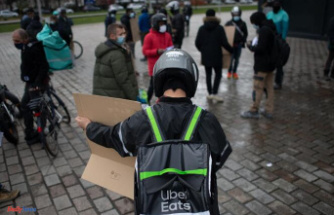What will we eat in the future? A few decades ago the response of science fiction was imaginative, striking and incredible but food in pills is not a way to come true in the 21st century. Nobody pretends it. In the era of hurry, vegetables, fruits, legumes, nuts or seeds will continue to be very present on our plate, as well as meat, although increasingly compensated with proteins of vegetable origin. The rupture does not come from the hand of new food, but of new combinations, of balanced nutrition contributions and production. Technology is already introducing in our diet an "invisible innovation" with a triple objective: that is healthier, sustainable and accessible.
"The diet of tomorrow will look more like grandma's spotlight, than very rare dishes". He says Beatriz Jacoste, Director of km Zero Food Innovation Hub, a pole of innovation dedicated to promoting solutions for the food ecosystem based in Valencia that has its way to become the Think Tank Spanish speaking. They know what are the signs of the future and how could the menu be able to consume naturally within 20 years, but we have already available tomorrow in countries that are at the forefront as the United States, Israel or Singapore. This is KM Zero's proposal.
To start a Maca capsule, "which is a supplement that gives us energy and can completely replace coffee". "On KM Zero we support a startup called Aldous Bio, who sells this supplement and many others who can promote our well-being throughout the day."
After something that may seem as common as cereals with milk. But there is trick. "Cereals that come from ancestral varieties such as quinoa, amaranth, who have been being cultivated but are very beneficial for the health of soils. It would be necessary to promote the recovery of these forgotten varieties." These cereals, easy to find, how perfect it would be marketed in containers of the Israeli company Tipa, with which this Hub also works, and "which are compostable and disappear after the months."
The milk, which would contribute the proteins, will be the most special. Not Milk is very similar to that of cow but it is made only with vegetables. "Using an algorithm called Giuseppe they have achieved a rare mixture of ingredients such as pineapple, chicoror, chickpeas ... something that would never have occurred to him and that gives an analogous taste to the traditional product," explains Jacoste.
It is a NOCO creation, a Chilean Unicorn Startup in which he has invested until Jeff Bezzos. This milk is already sold in the United States in Starbucks, for example, but has not yet reached Europe. To this we should add some seasonal fruit as an apple, grape or banana.
But we have a breakfast b option, because food also takes into account the pleasures and mood, the mood, which in the twentieth century translated into a "what the body asks for". "We can make some toast with mother dough bread, natural fermentation, that for our microbiome is very beneficial, and we accompany it with some of the Väcka cheese varieties, which is a vegetable cheese but replicated at a visual and organoleptic level. Conventional cow cheese, "he proposes Bea.
In addition, this cheese could be placed a QR of a Blockchain startup, traceable, which could expand information to the consumer about the origin of the ingredients, the nutritional information. "And now the tendency is to want to know everything about what we eat," adds Catalina Valencia, Community Lead of km Zero.
If we need a snack at mid-morning, they propose a yogurt, "but replacing sugar by a new ingredient that is called Miraculina, an African berry." It is driven by the Spanish company Baïa Food and its peculiarity is that when eating it, the perception of acid taste for the sweet in our mouths changes. "That makes the sugar dispensable in our diet." It is not yet marketed, but it has applications for the medical field for example, for people in chemotherapy treatments, which all metallic them.
We arrive at the time of the food and we would start with another capsule. This time, spirulina, which in addition to having a satiant effect has proteins that can enrich our diet.
To design our food, we could serve ourselves from an app called Jammer that, using the ingredients you have in the fridge, recommend a recipe. "That would serve us to put an end to the food waste," recalls Jacoste.
As there are days that do not want to cook, they propose a delivery, food at home. This time sushi, but very special because it has no fish. It is made of vegetables. It is produced by a Spanish company based in Madrid, Mimic Seafood and will soon be on sale. "From tomato they do tuna simulation and do not use rice, but a marine cereal that is called zostera and that Ángel León, the chef of the sea, has spoken a lot. It allows to cultivate something very similar to rice on a new surface as It can be the sea, "says the experts.
Getting the taste of fish without using it is complicated, but they get it with fat grown in the laboratory. "Its origin is 100% vegetable and can be enriched, for example, with omega3. The company that does it is also Spanish and is called Cubiq".
But it does not finish here. The soy sauce that accompanies the sushi of Mimic Seafoods comes in a capsule made of algae of a company called notpla that completely replaces the plastic.
All this must be accompanied by the greatest superstime of life that is water. In this case it would be Ocean52, another Spanish company, which makes water in can, the most recyclable packaging, "and enriches it with beneficial minerals and allocates 52% of its benefits to cleaning the oceans.
If you do not want to dessert, remember, we can ask for a Darks Store, "which are minisklymarkets that take you anything home in 10 minutes and that are proliferating in cities."
The hour of the snack arrives. If we are going to go to the gym and we need something that gives us strength, they propose to take "a protein shake with insect flour or a barrel" of the Trillions brand.
Instead, if what you want is a whim, "a good chocolate from personal food that is called NewYou". "They are functional chocolates that with their probiotic ingredients help what you are looking for. For example, with Moringa have one, Slim, which ensure that it is to lose weight, another to reinforce the immune system and another with pea and hemp proteins to maintain the level of energy, "explain.
At dinner we also arrived with two options. If you choose to leave, and you are in Tel Aviv, the proposal is to go to the Supermeat restaurant, "in which we are going to give us a laboratory chicken burger and we will be able to see some Bioreactor, which are the structures in which they manufacture This type of meat that we are going to try then. "
How is this meat created? The mother cell is removed from the chicken, without sacrificing, and the muscle tissue is grown in the bioreactor. I apply this texture formed. "In this way, meat can be generated without sacrificing animals or large farms. It would be in a more controlled environment, I would not need antibiotics. That is why it call it Clean Meat (clean meat). There are companies like Aleph Farms that already produce it, But only in Israel and Singapore, its consumption has been allowed.
If we opted for home dinner, we propose to take a tryptophan capsule, which has those properties that induce rest, and cook something very always and fast, as can be a revolving. In this case with Koroko eggs, another Spanish company that markets eggs flavored to truffle, ham, cheese or garlic. There is also the vegan option, "which is an egg type that is composed exclusively of plant products and that offer several companies, including the Israeli Zero Egg," says Km Zero director.
The revolving can be accompanied by a salad that comes from a "hydroponic culture", which are vegetables that develop in an urban, controlled "nuclei without the need for arable surface, with less water and without fertilizer or pesticides."
"In Spain, with the garden very close," says Catalina Valencia, "this can sound weird, but there are parts of the world where these solutions are very applicable. For example in northern Europe is already developing a lot for lack of light. ".
"There are zones called Food Desert (food deserts) where there is no access to fresh food. For example, I visited a school in the Bronx, in New York, where only families used ultraprocessed food and a towers of a school was mounted. Hydroponic crops that allowed them to take home fresh vegetables ", Beatriz Jacoste says. The ingredients of this salad would buy them in the supermarket because there are large infarm companies or Aeroparms who are already selling them.
To make the purchase we would use an app called wasteless dynamic prices, which favors that the consumer buy what is going to expire before. "We changed the stickers that now exist by this digital tool that avoids food waste, which is a third of what is produced with what that entails," they remember.
At this dinner we could allow us to take a beer that, in this case, propose that it be from Patagonia Provisions, a clothing company that has developed a food line sold in some American States. This beer is made with a type of wheat that is called Kernza whose feature is that it is perennial and has very deep roots to better look for water. "It is very efficient and allows to revitalize desertified soils."
These are examples of the signs of how the feeding of the future that has selected for the world this Hub, which has the advice of a network of more than 50 pioneers "who are investigating and developing the feeding of the next generations," he explains the director. The solutions of it will be collected in the Fooduristic Book of ZM Zero, which will be published on December 14, and are commonly put on FTTHS, an annual international event to discuss the trends, disruption and challenges of the food ecosystem.
How will these innovations accept the market? The key is that they are "invisible". In the words of the experts, "Technology and innovation has to stay in the process so that the food is more sustainable and healthy, but that the consumer notes".
There is still a way in three directions. "Food is part of our tradition, our culture and our memories, unless the analog is just as rich, easy to prepare and is at the same price, there will be anyone who includes it in its diet," says Jacoste.
"If the challenge in the 60s was democratizing nutrition producing en masse and praising the cost, now we have overnnutrition of food that are not healthy and produced in a non-compatible way. The goal is to reverse that with a lot of technology and development for Climb an industrial product without the consumer perceive that it is not the traditional, "he adds.
Overcoming reluctance is another challenge: "All food comes from laboratory: a yogurt, a potato, any product on the market has been investigated and developed in a laboratory," sentence. Welcome to the table of the future.
Date Of Update: 08 December 2021, 10:44











